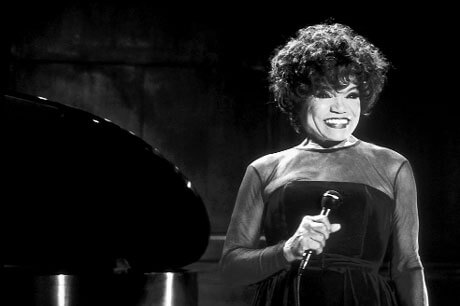On a shoestring, Robert Cary painstakingly re-creates an earlier era
“Being gay, my whole worldview is the disparity of way things look and the ways things feel. This is why Billie Golden is the character I connect with,” said Robert Cary, who directed and co-wrote “Anything But Love” with Isabel Rose, who stars as Billie. “She creates a world that reflects the way she feels inside even though the rest of the world resists that.”
The idea for the film, which portrays the efforts of Billie to make it on the cabaret circuit, began when the two friends, Cary and Rose, saw Eartha Kitt at the Café Carlyle back in 1989.
“Isabel wanted to tell a story about a woman singing at an airport cocktail dive who longs to be a cabaret singer,” Cary explained. “I thought it was interesting, and added elements of my own to it.”
Cary even wrote a role for Kitt, who appears in the film and performs live.
“Anything But Love” is a throwback to those musical romances of the 1940s, starring actresses like June Alyson.
“It’s a woman’s picture in the old fashioned sense,” Cary said. “Billie has to make a choice between heart, home, and her career.”
Significantly, the director made it a point to shoot the film as if it were a classic movie. He is proud of this achievement, boasting, “We didn’t do anything you couldn’t do in the 1950s. We even used film that was rich in color and detail and not sensitive to light.”
The effort created challenges for Cary.
“The split screen scene was hard to do because we didn’t have digital equipment,” he said, noting that the production crew had to measure everything for a scene featuring Billie and her hunky beau (Cameron Bancroft) talking on the phone to match the shots perfectly.
Given the fact that the film had a budget of less than $1 million, Cary’s accomplishment is all the more impressive. However, the project’s humble origins also involved more than the usual amount of drawbacks.
“Not being a characteristic indie, ‘Anything But Love’ does not have the hallmark of [being] edgy,” Cary confided. “It took a long time for festivals to pay attention to us.”
The adorable Cary, who lives with playwright Jonathan Tolins (“The Last Sunday in June”), has always had a creative streak. He grew up in Los Angeles with a family of entertainers, and was a ballet dancer before doing acting, singing, writing, and directing.
Cary developed his interest in cinema as a youth with unique access to watching TV shows and movies as they were being made. He also admits to living in a house closer in style to 1955 than 2003, “except that TVs back then were not as big as mine” and when he listens to soundtracks of MGM film scores—as he frequently does—they are on CD.
“I find incredible comfort in music,” he said. “It is like a beacon for me,”
Music, of course, is a crucial element in the film. Cary effuses about being able to use songs by Jimmy McHugh and Arthur Schwartz.
“I had not imagined that we could use those composers’ songs in such a focused way.” he recalled, describing how he assembled the score for “Anything But Love.” After contacting the appropriate folks, “it was their enthusiasm about the script and the idea that made it possible. Music rights are very expensive. We were thrilled with what we got.”
With so much of the film made up of musical performances, it was critical to make these scenes note–perfect.
“Isabel sang some things live on set when we shot, and she did other things to a playback in the old fashioned MGM way,” Cary said. “Everything had to be right in the shot. If the sync was off, we had to go back and do it again.”
Likewise, for a dance number—one of the film’s highlights. Cary had the opportunity to shoot the routine he choreographed on a soundstage, just like the musicals of yore.
“That was a luxury,” he acknowledged, even though he had only eight hours to complete 36 set-ups.
In keeping with the films of the immediate post-war era, “Anything But Love” is refreshingly unironic, and free of cynicism.
“That can be corny,” Cary acknowledged, “but I’m fine with that. We did it with our hearts. Life is not a fantasy. The idea of not giving up on your dreams, and not making compromises for the sake of emotional safety is very close to my heart. In a strange way, my life has imitated the life of the heroine.”
Cary’s determination and willingness to take on daunting tasks in the pursuit of his craft hold the promise of continued success.
“I am anxious for my next directing opportunity,” he said confidently, with one eye on the past but the other fixed firmly on the future.



































